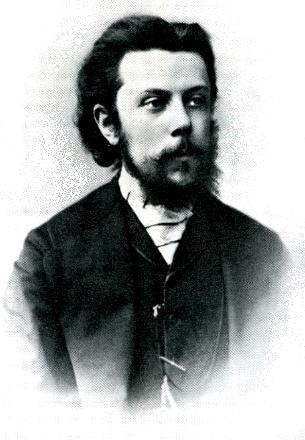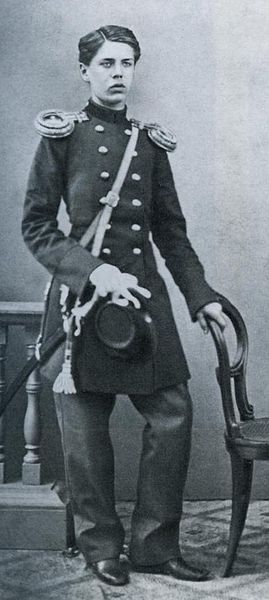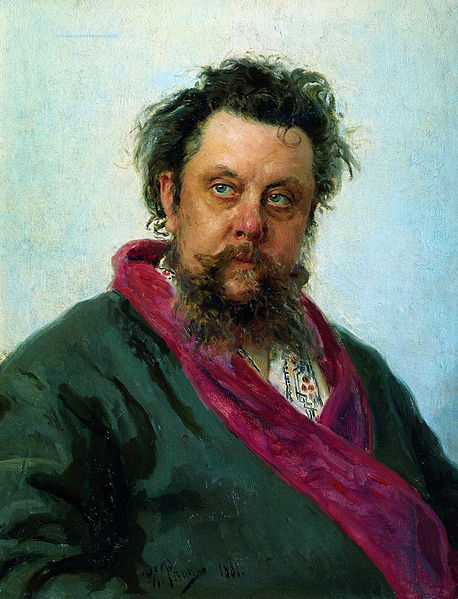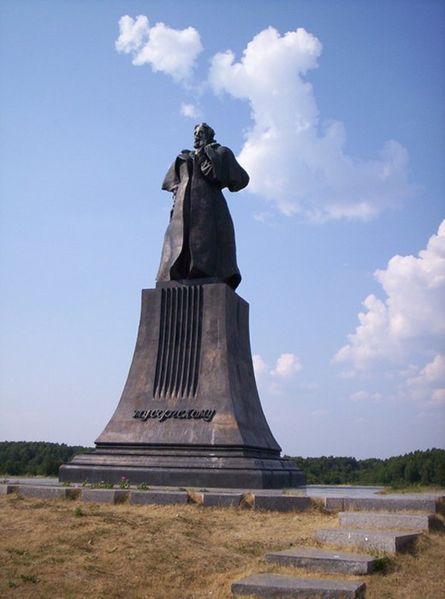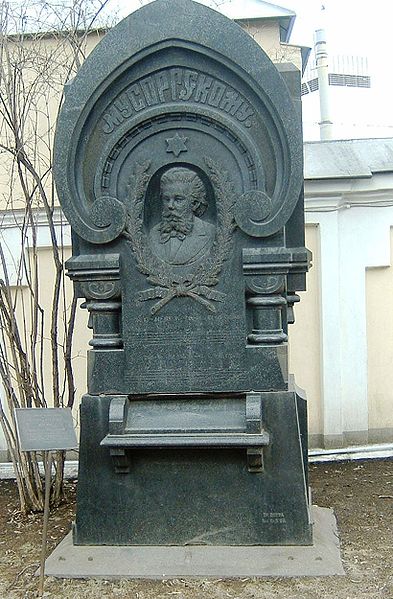<Back to Index>
- Composer Modest Petrovich Mussorgsky, 1839
PAGE SPONSOR
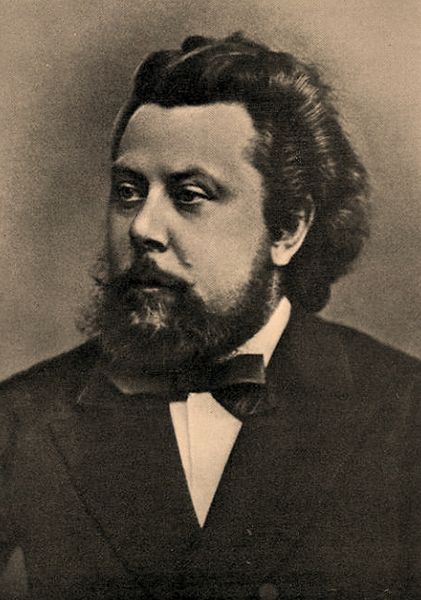
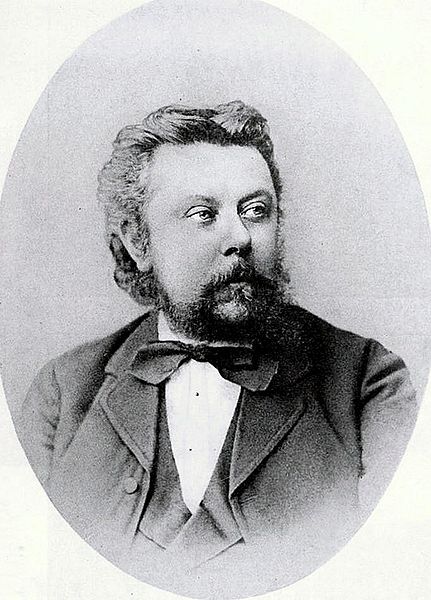
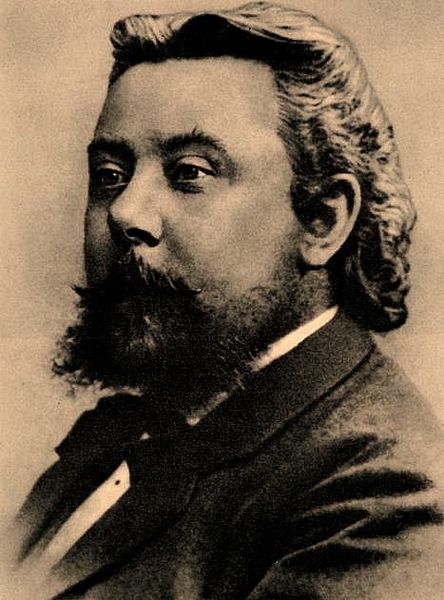
Modest Petrovich Mussorgsky (Russian: Моде́ст Петро́вич Мýсoргский; 21 March [O.S. 9 March]1839 – 28 March [O.S. 16 March] 1881) was a Russian composer, one of the group known as 'The Five'. He was an innovator of Russian music in the romantic period. He strove to achieve a uniquely Russian musical identity, often in deliberate defiance of the established conventions of Western music.
Many of his works were inspired by Russian history, Russian folklore, and other nationalist themes. Such works include the opera Boris Godunov, the orchestral tone poem Night on Bald Mountain, and the piano suite Pictures at an Exhibition.
For
many years Mussorgsky's works were mainly known in versions revised or
completed by other composers. Many of his most important compositions
have recently come into their own in their original forms, and some of
the original scores are now also available.
Mussorgsky was born in Karevo, Toropets, Pskov region, Imperial Russia, 400 km (250 mi) south of Saint Petersburg. His wealthy and land owning family, the noble family of Mussorgsky, is reputedly descended from the first Ruthenian ruler, Rurik, through the sovereign princes of Smolensk. At age six Mussorgsky began receiving piano lessons from his mother, herself a trained pianist. His progress was sufficiently rapid that three years later he was able to perform a John Field concerto and works by Franz Liszt for family and friends. At 10, he and his brother were taken to Saint Petersburg to study at the elite Peterschule (St. Peter's School). While there, Modest studied the piano with the noted Anton Gerke. In 1852, the 12 year old Mussorgsky published a piano piece titled "Porte - enseigne Polka" at his father's expense.
Mussorgsky's parents planned the move to Saint Petersburg so that both their sons would renew the family tradition of military service. To this end, Mussorgsky entered the Cadet School of the Guards at age 13. Sharp controversy had arisen over the educational attitudes at the time of both this institute and its director, a General Sutgof. All agreed the Cadet School could be a brutal place, especially for new recruits. More tellingly for Mussorgsky, it was likely where he began his eventual path to alcoholism. According to a former student, singer and composer Nikolai Kompaneisky, Sutgof "was proud when a cadet returned from leave drunk with champagne."
Music
remained important to him, however. Sutgof's daughter was also a pupil
of Herke, and Mussorgsky was allowed to attend lessons with her. His skills as a pianist made him much in demand by fellow cadets; for them he would play dances interspersed with his own improvisations. In 1856 Mussorgsky – who had developed a strong interest in history and
studied German philosophy – successfully graduated from the Cadet
School. Following family tradition he received a commission with the Preobrazhensky Regiment, the foremost regiment of the Russian Imperial Guard.
In October 1856 the 17 year old Mussorgsky met the 22 year old Alexander Borodin while both men served at a military hospital in Saint Petersburg. The two were soon on good terms. Borodin later remembered,
His little uniform was spic and span, close - fitting, his feet turned outwards, his hair smoothed down and greased, his nails perfectly cut, his hands well groomed like a lord's. His manners were elegant, aristocratic: his speech likewise, delivered through somewhat clenched teeth, interspersed with French phrases, rather precious. There was a touch — though very moderate — of foppishness. His politeness and good manners were exceptional. The ladies made a fuss of him. He sat at the piano and, throwing up his hands coquettishly, played with extreme sweetness and grace (etc) extracts from Trovatore, Traviata, and so on, and around him buzzed in chorus: "Charmant, délicieux!" and suchlike. I met Modest Petrovich three or four times at Popov's in this way, both on duty and at the hospital."
More portentous was Mussorgsky's introduction that winter to Alexander Dargomyzhsky, at that time the most important Russian composer after Mikhail Glinka. Dargomyzhsky was impressed with Mussorgsky's pianism. As a result, Mussorgsky became a fixture at Dargomyzhsky's soirées. There, critic Vladimir Stasov later recalled, he began "his true musical life."
Over the next two years at Dargomyzhsky's, Mussorgsky met several figures of importance in Russia's cultural life, among them Stasov, César Cui (a fellow officer), and Mily Balakirev. Balakirev had an especially strong impact. Within days he took it upon himself to help shape Mussorgsky's fate as a composer. He recalled to Stasov, "Because I am not a theorist, I could not teach him harmony (as, for instance Rimsky - Korsakov now teaches it) ... [but] I explained to him the form of compositions, and to do this we played through both Beethoven symphonies [as piano duets] and much else (Schumann, Schubert, Glinka, and others), analyzing the form." Up to this point Mussorgsky had known nothing but piano music; his knowledge of more radical recent music was virtually non - existent. Balakirev started filling these gaps in Mussorgsky's knowledge.
In 1858, within a few months of beginning his studies with Balakirev, Mussorgsky resigned his commission to devote himself entirely to music. He also suffered a painful crisis at this time. This may have had a spiritual component (in a letter to Balakirev the young man referred to "mysticism and cynical thoughts about the Deity"), but its exact nature will probably never be known. In 1859, the 20 year old gained valuable theatrical experience by assisting in a production of Glinka's opera A Life for the Tsar on the Glebovo estate of a former singer and her wealthy husband; he also met Anatoly Lyadov and enjoyed a formative visit to Moscow – after which he professed a love of "everything Russian".
In
spite of this epiphany, Mussorgsky's music still leaned more toward
foreign models; a four - hand piano sonata which he produced in 1860
contains his only movement in sonata form. Nor is any 'nationalistic' impulse easily discernible in the incidental music for Serov's play Oedipus in Athens, on which he worked between the ages of 19 and 22 (and then abandoned unfinished), or in the Intermezzo in modo classico for
piano solo (revised and orchestrated in 1867). The latter was the only
important piece he composed between December 1860 and August 1863: the
reasons for this probably lie in the painful re-emergence of his
subjective crisis in 1860 and the purely objective difficulties which
resulted from the emancipation of the serfs the
following year – as a result of which the family was deprived of half
its estate, and Mussorgsky had to spend a good deal of time in Karevo
unsuccessfully attempting to stave off their looming impoverishment.
By this time, Mussorgsky had freed himself from the influence of Balakirev and was largely teaching himself. In 1863 he began an opera – Salammbô – on which he worked between 1863 and 1866 before losing interest in the project. During this period he had returned to Saint Petersburg and was supporting himself as a low grade civil servant while living in a six man 'commune'. In a heady artistic and intellectual atmosphere, he read and discussed a wide range of modern artistic and scientific ideas – including those of the provocative writer Chernyshevsky, known for the bold assertion that, in art, "form and content are opposites". Under such influences he came more and more to embrace the ideal of artistic 'realism' and all that it entailed, whether this concerned the responsibility to depict life 'as it is truly lived'; the preoccupation with the lower strata of society; or the rejection of repeating, symmetrical musical forms as insufficiently true to the unrepeating, unpredictable course of 'real life'.
'Real life' affected Mussorgsky painfully in 1865, when his mother died; it was at this point that the composer had his first serious bout of either alcoholism or dipsomania. The 26 year old was, however, on the point of writing his first 'realistic' songs (including 'Hopak' and 'Darling Savishna', both of them composed in 1866 and among his first 'real' publications the following year). 1867 was also the year in which he finished the original orchestral version of his Night on Bald Mountain (which, however, Balakirev criticised and refused to conduct, with the result that it was never performed during Mussorgsky's lifetime).
Mussorgsky's
career as a civil servant was by no means stable or secure: though he
was assigned to various posts and even received a promotion in these
early years, in 1867 he was declared 'supernumerary' – remaining 'in
service', but receiving no wages. Decisive developments were occurring
in his artistic life, however. Although it was in 1867 that Stasov first
referred to the 'kuchka'
('The Five') of Russian composers loosely grouped around Balakirev,
Mussorgsky was by then ceasing to seek Balakirev's approval and was
moving closer to the older Alexander Dargomyzhsky .
Since 1866 Dargomïzhsky had been working on his opera The Stone Guest, a version of the Don Juan story with a Pushkin text that he declared would be set "just as it stands, so that the inner truth of the text should not be distorted", and in a manner that abolished the 'unrealistic' division between aria and recitative in favor of a continuous mode of syllabic but lyrically heightened declamation somewhere between the two.
Under the influence of this work (and the ideas of Georg Gottfried Gervinus,
according to whom "the highest natural object of musical imitation is
emotion, and the method of imitating emotion is to mimic speech"),
Mussorgsky in 1868 rapidly set the first eleven scenes of Nikolai Gogol's The Marriage (Zhenitba),
with his priority being to render into music the natural accents and
patterns of the play's naturalistic and deliberately humdrum dialogue.
This work marked an extreme position in Mussorgsky's pursuit of
naturalistic word - setting: he abandoned it unorchestrated after reaching
the end of his 'Act 1', and though its characteristically
'Mussorgskyian' declamation is to be heard in all his later vocal music,
the naturalistic mode of vocal writing more and more became merely one
expressive element among many.
A few months after abandoning Zhenitba, the 29 year old Mussorgsky was encouraged to write an opera on the story of Boris Godunov. This he did, assembling and shaping a text from Pushkin's play and Karamzin's history. He completed the large scale score the following year while living with friends and working for the Forestry Department. In 1871, however, the finished opera was rejected for theatrical performance, apparently because of its lack of any 'prima donna' role. Mussorgsky set to work producing a revised and enlarged 'second version'. During the next year, which he spent sharing rooms with Rimsky - Korsakov, he made changes that went beyond those requested by the theater. In this version the opera was accepted, probably in May 1872, and three excerpts were staged at the Mariinsky Theatre in 1873. It is often asserted that in 1872 the opera was rejected a second time, but no specific evidence for this exists.
By the time of the first production of Boris Godunov in February 1874, Mussorgsky had taken part in the ill fated Mlada project (in the course of which he had made a choral version of his Night on Bald Mountain) and had begun Khovanshchina.
Though far from being a critical success – and in spite of receiving
only a dozen or so performances – the popular reaction in favor of Boris made this the peak of Mussorgsky's career.
From this peak a pattern of decline becomes increasingly apparent. Already the Balakirev circle was disintegrating. Mussorgsky was especially bitter about this. He wrote to Vladimir Stasov, "[T]he mighty Koocha has degenerated into soulless traitors." In drifting away from his old friends, Mussorgsky had been seen to fall victim to 'fits of madness' that could well have been alcoholism related. His friend Viktor Hartmann had died, and his relative and recent roommate Arseny Golenishchev - Kutuzov (who furnished the poems for the song cycle Sunless and would go on to provide those for the Songs and Dances of Death) had moved away to get married.
While alcoholism was Mussorgsky's personal weakness, it was also a behavior pattern considered typical for those of Mussorgsky's generation who wanted to oppose the establishment and protest through extreme forms of behavior. One contemporary notes, "an intense worship of Bacchus was considered to be almost obligatory for a writer of that period. It was a showing off, a 'pose,' for the best people of the [eighteen-] sixties." Another writes, "Talented people in Russia who love the simple folk cannot but drink." Mussorgsky spent day and night in a Saint Petersburg tavern of low repute, the Maly Yaroslavets, accompanied by other bohemian dropouts. He and his fellow drinkers idealized their alcoholism, perhaps seeing it as ethical and aesthetic opposition. This bravado, however, led to little more than isolation and eventual self - destruction.
For a time Mussorgsky was able to maintain his creative output: his compositions from 1874 include Sunless, the Khovanschina Prelude, and the piano suite Pictures at an Exhibition (in memory of Hartmann); he also began work on another opera based on Gogol, The Fair at Sorochyntsi (for which he produced another choral version of Night on Bald Mountain).
In the years that followed, Mussorgsky's decline became increasingly steep. Although now part of a new circle of eminent personages that included singers, medical men and actors, he was increasingly unable to resist drinking, and a succession of deaths among his closest associates caused him great pain. At times, however, his alcoholism would seem to be in check, and among the most powerful works composed during his last 6 years are the four Songs and Dances of Death. His civil service career was made more precarious by his frequent 'illnesses' and absences, and he was fortunate to obtain a transfer to a post (in the Office of Government Control) where his music loving superior treated him with great leniency – in 1879 even allowing him to spend 3 months touring 12 cities as a singer's accompanist.
The decline could not be halted, however. In 1880 he was finally dismissed from government service. Aware of his destitution, one group of friends organized a stipend designed to support the completion of Khovanschina; another group organized a similar fund to pay him to complete The Fair at Sorochyntsi. However, neither work was completed (although Khovanschina, in piano score with only two numbers uncomposed, came close to being finished).
In early 1881 a desperate Mussorgsky declared to a friend that there was 'nothing left but begging', and suffered four seizures in rapid succession. Though he found a comfortable room in a good hospital – and for several weeks even appeared to be rallying – the situation was hopeless. Repin painted the famous red - nosed portrait in what were to be the last days of the composer's life: a week after his 42nd birthday, he was dead. He was interred at the Tikhvin Cemetery of the Alexander Nevsky Monastery in Saint Petersburg.
Mussorgsky, like others of 'The Five', was perceived as extremist by the Emperor and much of his court. This may have been the reason Tsar Alexander III personally crossed off Boris Godunov from the list of proposed pieces for the Imperial Opera in 1888.
Mussorgsky's works, while strikingly novel, are stylistically Romantic and draw heavily on Russian musical themes. He has been the inspiration for many Russian composers, including most notably Dmitri Shostakovich (in his late symphonies) and Sergei Prokofiev (in his operas).
In 1868/9 he composed the opera Boris Godunov, about the life of the Russian tsar, but it was rejected by the Mariinsky Opera. Mussorgsky thus edited the work, making a final version in 1874. The early version is considered darker and more concise than the later version, but also more crude. Nikolai Rimsky - Korsakov re-orchestrated the opera in 1896 and revised it in 1908. The opera has also been revised by other composers, notably Shostakovich, who made two versions, one for film and one for stage.
Khovanshchina, a more obscure opera, was unfinished and unperformed when Mussorgsky died, but it was completed by Rimsky - Korsakov and received its premiere in 1886 in Saint Petersburg. This opera, too, was revised by Shostakovich. The Fair at Sorochyntsi, another opera, was left incomplete at his death but a dance excerpt, the Gopak, is frequently performed.
Mussorgsky's most imaginative and frequently performed work is the cycle of piano pieces describing paintings in sound called Pictures at an Exhibition. This composition, best known through an orchestral arrangement by Maurice Ravel, was written in commemoration of his friend, the architect Viktor Hartmann.
One of Mussorgsky's most striking pieces is the single - movement orchestral work Night on Bald Mountain. The work enjoyed broad popular recognition in the 1940s when it was featured, in tandem with Schubert's 'Ave Maria', in the Disney film Fantasia.
Among the composer's other works are a number of songs, including three song cycles: The Nursery (1872), Sunless (1874) and Songs and Dances of Death (1877); plus Mephistopheles' Song of the Flea and many others. Important early recordings of songs by Mussorgsky were made by tenor Vladimir Rosing in the 1920s and 30s. Other recordings have been made by Boris Christoff between 1951 and 1957 and by Sergei Leiferkus in 1993.
Contemporary opinions of Mussorgsky as a composer and person varied from positive to ambiguous to negative. Mussorgsky's eventual supporters, Stasov and Balakirev, initially registered strongly negative impressions of the composer. Stasov wrote Balakirev, in an 1863 letter, "I have no use whatever for Mussorgsky. All in him is flabby and dull. He is, I think, a perfect idiot. Were he left to his own devices and no longer under your strict supervision, he would soon run to seed as all the others have done. There is nothing in him."
Balakirev agreed: "Yes, Mussorgsky is little short of an idiot."
Mixed impressions are recorded by Rimsky - Korsakov and Tchaikovsky, colleagues of Mussorgsky who, unlike him, made their living as composers. Both praised his talent while expressing disappointment with his technique. About Mussorgsky's scores Rimsky - Korsakov wrote, "They were very defective, teeming with clumsy, disconnected harmonies, shocking part - writing, amazingly illogical modulations or intolerably long stretches without ever a modulation, and bad scoring. ...what is needed is an edition for practical and artistic purposes, suitable for performances and for those who wish to admire Mussorgsky's genius, not to study his idiosyncrasies and sins against art."
Rimsky - Korsakov's own editions of Mussorgsky's works met with some criticism of their own. Rimsky - Korsakov's student, Anatoly Lyadov, found them to be lacking, writing "It is easy enough to correct Mussorgsky's irregularities. The only trouble is that when this is done, the character and originality of the music are done away with, and the composer's individuality vanishes."
Tchaikovsky, in a letter to his patroness Nadezhda von Meck was also critical of Mussorgsky: "Mussorgsky you very rightly call a hopeless case. In talent he is perhaps superior to all the [other members of The Five], but his nature is narrow minded, devoid of any urge towards self - perfection, blindly believing in the ridiculous theories of his circle and in his own genius. In addition, he has a certain base side to his nature which likes coarseness, uncouthness, roughness.... He flaunts ... his illiteracy, takes pride in his ignorance, mucks along anyhow, blindly believing in the infallibility of his genius. Yet he has flashes of talent which are, moreover, not devoid of originality."
Not all of the criticism of Mussorgsky was negative. In a letter to Pauline Viardot, Ivan Turgenev recorded his impressions of a concert he attended in which he met Mussorgsky and heard two of his songs and excerpts from Boris Godunov and Khovanshchina): "Today I was invited to have dinner in old Petrov's house: I gave him a copy of your song, which pleased him greatly [...] Petrov still admires you as enthusiastically as in the past. In his drawing room there's a bust of you, crowned with laurels, which still bears a strong resemblance to you. I also met his wife (the contralto) [Anna Vorobyova - Petrova, who created the role of Vanya in Glinka's A Life for the Tsar]. She is sixty years old... After dinner she sang two quite original and touching romances by Musorgsky (the author of Boris Godunov, who was also present), in a voice that is still young and charming and has a very expressive timbre. She sang them wonderfully! I was moved to tears, I assure you. Then Mussorgsky played for us and sang, with a rather hoarse voice, some excerpts from his opera and the other one that he is composing now – and the music seemed to me very characteristic and interesting, upon my honor! Old Petrov sang the role of the old profligate and vagabond monk [Varlaam's song about Ivan the Terrible] – it was splendid! I am starting to believe that there really is a future in all of this. Outwardly, Mussorgsky reminds one of Glinka – it is just that his nose is all red (unfortunately, he is an alcoholic), he has pale but beautiful eyes, and fine lips which are squeezed into a fat face with flabby cheeks. I liked him: he is very natural and unaffected, and does not put on any airs. He played us the introduction to his second opera [Khovanshchina]. It is a bit Wagnerian, but full of feeling and beautiful. Forward, forward! Russian artists!!"
Western perceptions of Mussorgsky changed with the European premiere of Boris Godunov in 1908. Before the premiere, he was regarded as an eccentric in the west. Critic Edward Dannreuther, wrote, in the 1905 edition of The Oxford History of Music, "Mussorgsky, in his vocal efforts, appears wilfully eccentric. His style impresses the Western ear as barbarously ugly."
However, after the premiere, views on Mussorgsky's music have drastically changed. Gerald Abraham, a musicologist, and an authority on Mussorgsky: "As a musical translator of words and all that can be expressed in words, of psychological states, and even physical movement, he is unsurpassed; as an absolute musician he was hopelessly limited, with remarkably little ability to construct pure music or even a purely musical texture."
The suite Pictures at an Exhibition has inspired homages in a broad range of musical styles. A version featured in two albums by the British trio Emerson, Lake & Palmer incorporates elements of progressive rock, jazz and folk music (1971 / 2008). An electronic music adaptation by Isao Tomita was done in 1975. A heavy metal arrangement of the entire suite was released by German band Mekong Delta; another metal band, Armored Saint,
utilised the "Great Gate of Kiev"'s main theme as the introduction to
the track "March of the Saint". In 2002, electronic musician - composer Amon Tobin paraphrased Gnomus for the track "Back From Space" on his album Out from Out Where. In 2003, guitarist - composer Trevor Rabin released his electric guitar adaptation of "Promenade", once intended for the Yes album Big Generator, and later included on his demo album 90124.
In 2005 Animusic 2 was released with an orchestration which was titled
"Cathedral Pictures". It is based on the Emerson, Lake, & Palmer
version, and thus there are only three movements: the first "Promenade",
"Hut on Fowl Legs", and "The Great Gate of Kiev".
